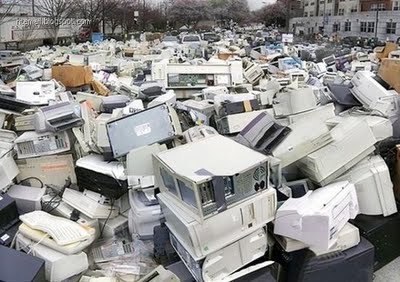One of the major environmental problems that has been caused by the modern digital revolution is the amount of electronic waste that is generated. This ‘electronic trash’ has to be dumped or recycled somewhere; its potential impact on the natural environment and on human health is regarded by many experts as a ‘ticking time bomb’. The amount of electronic waste that is being produced today is phenomenal, not only because there are so many electronic devices out there but also because they have built-in redundancy, i.e. they are designed to last for only a short time so that you are obliged to buy a new one every few years.
The consequence of all this is that many toxic materials are seeping into the environment and contaminating the underground water table, which may eventually make it unfit for human or animal consumption. Other toxins are volatile and release toxic particles into the air; these particles eventually enter the food chain or pollute the sea.
The hazardous components of electronic trash include barium, which is used to protect computer users against radiation. Even limited exposure to barium can cause brain tumors and have a negative impact on the muscles, heart, liver and spleen. Chromium is regarded as one of the most threatening toxic wastes as it can penetrate cells and damage the DNA. Phosphorus, which is used in phosphor panels, is also toxic, so as lead, which is used in keyboards and display screens. Lead can have very negative impacts on the nervous system, blood circulation, kidneys and immune system of the body. Color and black inks from printers also contain a variety of toxins including heavy metals which can cause respiratory distress and cancers.
The solution to the problem is to dispose off electronic waste sensibly and through the proper channels, to recycle as much electronic waste as possible, and to buy products that contain the minimum amount of toxic substances. Manufacturers can assist by minimizing the use of toxic materials in the manufacture of electronic devices.
Recycling is not only about keeping the environment clean, it is also about turning waste into something useful, reducing the amount of litter and pollution, and extending the life of landfill sites. Recycling also conserves scarce and valuable natural resources, saves energy and water, and supports job creation.
In Bahrain, the Public Commission for the Protection of Marine Resources, Environment and Wildlife is taking the lead in promoting the wise disposal and recycling of electronic waste. Contact them for more information on what you can do to help solve this serious problem.
Professor Mike Bruton
MTE Studios Director,
Bahrain Science Centre.

